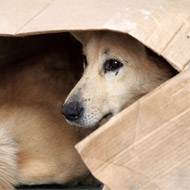RSPCA set for a surge in abandoned animals

Calls to the RSPCA about abandoned animals spiked by almost 50 per cent from June to August last year.
The RSPCA is preparing itself for a surge in abandoned animals as new figures show summer 2017 was an incredibly busy time for the animal charity.
According to the figures, calls to the RSPCA about abandoned animals spiked by almost 50 per cent from June to August last year, compared to the colder months.
The figures also show the number of abandoned animals taken in by the RSPCA peaked in June 2017, with 850 dumped animals rescued.
Summer is the peak season for the RSPCA and the warmer months of 2017 saw more than 10,000 calls to its 24-hour emergency hotline - that’s one every 12 minutes. The calls involved cats tied up in bags, horses abandoned at the roadside and dogs dumped out with the rubbish.
“With the number of calls rising and an increase in the number of animals collected, we are facing another welfare crisis this year as we head into the summer months,” explained RSPCA assistant director of inspectorate Dermot Murphy.
“Last summer our team of inspectors and officers investigated more complaints of abandoned animals than they had done for two years which shows a worrying trend that things might be getting worse.
“We try to help as many animals as we can but we have just 332 inspectors which means one inspector for every 162,000 people so we have to prioritise the animals who are suffering most.”



 The Animal and Plant Health Agency (APHA) has updated its online reporting service for dead wild birds.
The Animal and Plant Health Agency (APHA) has updated its online reporting service for dead wild birds.